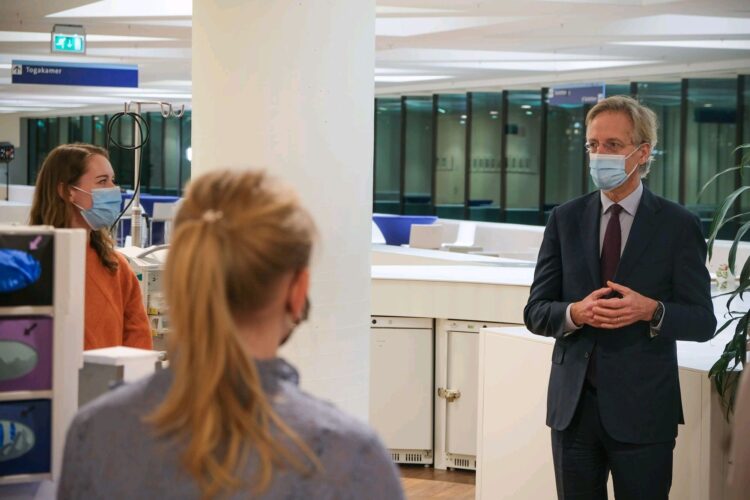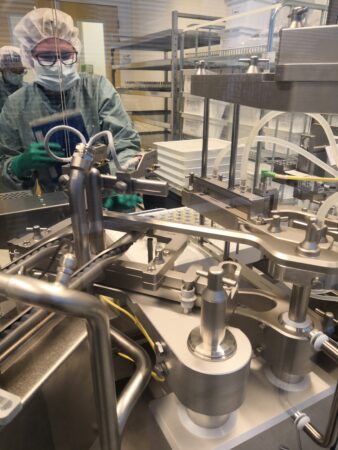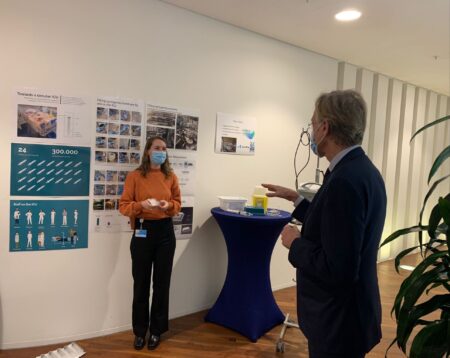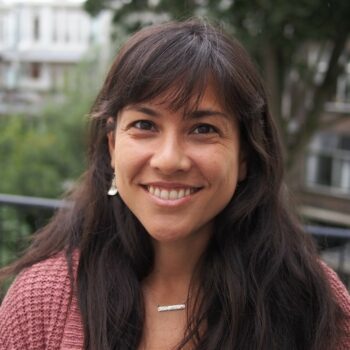Minister of OCW visits students of the Circular Intensive Care project
by Lisanne van den Berg & Margot Honkoop
April 4, 2022
On Monday, 7th of February the Minister of Culture, Science and Education Robbert Dijkgraaf visited Erasmus MC. One of his activities was to listen to our graduation projects of the Circular Intensive Care.

Sustainability and circularity is an increasingly important topic in society. Until recently however, this subject was not discussed at all-in hospitals, as their focus is typically on the quality and safety of staff and patients. The Health Convergence Initiative between Erasmus MC, Erasmus University Rotterdam, and TU Delft is shifting the narrative towards more green thinking in hospitals and set up graduation projects to bring Health and Sustainabilitiy together. We are both Medisign students interested in sustainability so we were very excited to have an opportunity to explore this new collaborative field.
First, a little bit about our project
We started our projects in September where we got to know the Intensive Care Unit (ICU) and its environmental impact hotspots. Impact hotspots are products used on the ICU that have a high environmental impact, but also present opportunities for sustainable innovation. During the past six months, we focused on reducing the environmental impact of two hotspots: syringes (Margot) and protective gloves (Lisanne). Conducting a Medisign project on the ICU from a sustainability perspective was quite innovative, and resulted in very useful outcomes for the ICU. Our project outcomes not only included product design proposals but also interventions that can be applied on a system level.
We conducted our research from multiple perspectives: the user, product and system.
An example of the user-focused perspective is Lisanne’s work where she investigated how disposable gloves were used by ICU nurses to identify opportunities to increase sustainability practices. Lisanne observed how gloves were dispensed, used and disposed of. She was surprised how often the nurses needed to change the gloves infection prevention rules. additional important information was gained while speaking with nurses during the breaks.
A system perspective example was our research on the amount of waste in the ICU, which can be excessive. The extent of the waste problem was quantified by doing a waste audit at the Paediatric Intensive Care Unit (PICU) of Erasmus MC. We collected a total of 107 kg of waste and analysed and opened 104 bags during four days. The waste mostly consisted of food, protective clothing and packaging. Many of these can be recycled, creating an opportunity to improve the system.

Margot even had the opportunity to visit the factory that fills syringes with medicine on a large scale. This factory (Apotheek A15) was included in the research to compare the environmental impact of “manually filled syringes” with “prefilled syringes”. It turned out that the prefilled syringes created a lot less waste in the whole lifecycle, and are therefore more sustainable.

Visit of the Ministers

We had the opportunity to present our projects to both the former (Ingrid van Engelshoven) and the current Minister of Education (Robbert Dijkgraaf). It was very cool to experience how our projects can provide new perspectives on sustainability in the hospital and attract so much attention. The ministers listened to us very carefully and even asked some questions. They were impressed by the total environmental impact of the healthcare sector of the Netherlands and were interested in the possible solutions we came up with. It was a very inspiring moment for us to be able to explain our projects to so many important people and made us realise that our projects matter.
About the Authors
Margot Honkoop – Link to her thesis here.
Supervisory Team
Ruud Balkenende (TU Delft, IDE)
Armagan Albayrak (TU Delft, IDE)
Nicole Hunfeld (Erasmus MC)
Lisanne van den Berg – Link to her thesis here.
Supervisory Team
Jan Carel Diehl (TU Delft, IDE)
Armagan Albayrak (TU Delft, IDE)
and Nicole Hunfeld (Erasmus MC)
